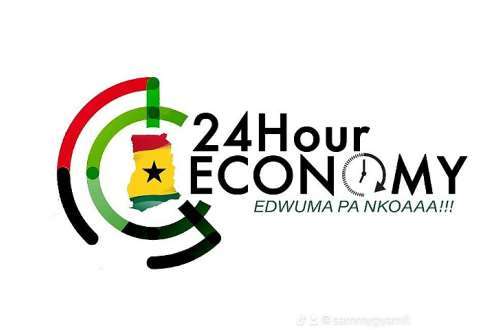The Executive Director of Global Info Analytics, Musa Danquah has disclosed that a significant number of voters preferred the National Democratic Congress proposed 24-hour economy policy over the Vice President Dr Mahamudu Bawumia’s digitalization policy.
Mr Danquah sharing some of the insight of its recent national poll conducted in December 2023 revealed that, 50% of its respondents indicated that the 24-hour economy policy proposed by the flagbearer of the opposition party, former President John Dramani is likely to influence their voting choice, compared to 25% favoring digitalization.
“How are the various campaign messages appealing to these voters who are very worried about joblessness? The 24HR economy, whether it is feasible or not and whether the proponents of the policy can stimulate demand and make it viable for organizations to fully participate using government purchasing power remains to be seen.
“However, it appears that the policy is much easier for ordinary voters to understand and how if successful, could create the jobs they envisioned”.
Musa Danquah, Executive Director Global Info Analytics
According to Mr Danquah, its survey sheds light on the priorities and concerns of voters, especially those grappling with unemployment and unstable income.
He noted that based on its survey analysis unemployment stands at 10.2%, accounting for approximately 1.9 million voters, while 7.3% are employed as casual laborers, facing the uncertainty of income stability.

Job and Economy, Top Concerns Of Voters
Furthermore, the Executive Director of the Global Info Analytics, Musa Danquah disclosed that according to the poll, 68% of respondents mentioned jobs as one of the top three issues that would influence their vote, which was closely followed by the economy at 66%.
Mr Danquah further recounted that the dire employment situation in the country would evidently shape voter preferences, with a keen interest in policies that promise immediate relief.
He thus indicated that among the two major policies of the ruling New Patriotic Party and the opposition National Democratic Congress, the 24- hour economy policy seems to resonate more with voters facing unemployment and unstable incomes.
According to him, among jobless voters, 52% expressed support for the National Democratic Congress proposed 24-hour economy policy, while only 19% favored digitalization.
Similarly, among casual laborers, the Executive Director of Global Info Analytics indicated that 47% of its respondents supported the National Democratic Congress 24-hour economy policy, while digitalization garnered 24% support.
Commenting on how the National Democratic Congress proposed 24-hour economy policy appeared to appeal to voters, Musa Danquah, the Executive Director of Global Info Analytics, recounted that the appreciation of the policy by the public lies in its tangible and immediate impact on job creation.
He stressed that the simplicity of the concept of the National Democratic Congress’s 24-hour economy policy makes it more accessible to ordinary voters who are concerned about their current employment status.
Moreover, Mr Danquah while acknowledging the critical role of digitalization in running an efficient economy, argued that the originators of the digitalization policy are yet to convince voters how the policy would address the immediate needs of voters who are jobless or engaged in precarious work.
According to him, digitalization, although essential in the long term, particularly in ensuring the effective delivery of public service is perceived by some voters as a potential creator of unemployment in the short term.
“While working for Transport for London in UK, there were several initiatives that were being implemented using technology which were intended to make the London Underground and other rail networks efficient.
“For example, there was a policy to close down ticket offices when the Oyster Card was introduced and we faced stiff backlash from the National Union of Rail, Maritime and Transport Workers (RMT) led by late Bob Crow, who led the unions from 2002 till his death in 2014, because the unions argued that it will lead to job losses among ticketing staff. Today, there are very few ticket office staff, Digitalization, have taken over the jobs the last time I visited London”.
Musa Danquah, Executive Director Global Info Analytics
In addition, Mr Danquah cautioning against attempt by the ruling New Patriotic Party to discredit the National Democratic Congress 24-hour economy policy drew parallels to the past, and highlighted how the National Democratic Congress’s attempt to discredit the Free Education Policy in 2016, proved counterproductive.
He thus argued that the ruing New Patriotic Party risks repeating the same mistake if it fails to offer solutions that resonate with the current concerns of voters, especially regarding joblessness.
The Executive Director of the Global Info Analytics concluded by stating that the challenge for the Vice President, Dr Mahamudu Bawumia’s campaign lies in presenting a compelling narrative that bridges the gap between technological progress and the pressing needs of job-seeking citizens.
READ ALSO: YEA Employs 282 Former Tollbooth Workers



















